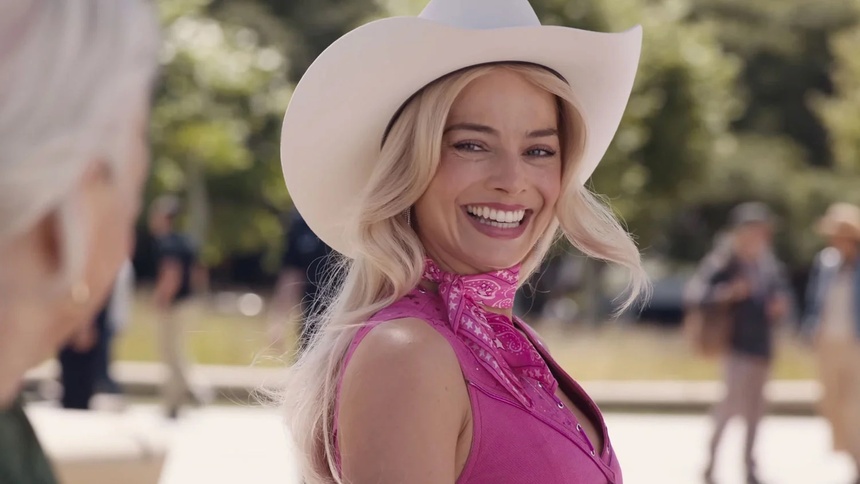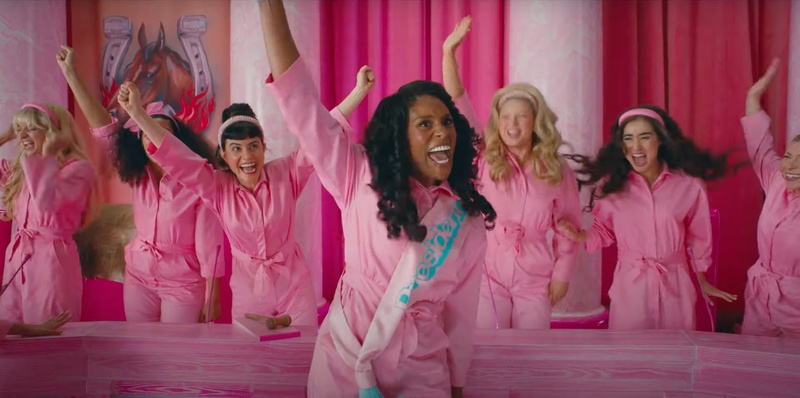BARBIE Review: An Existential Crisis in Plastic, It's Fantastic
Margot Robbie and Ryan Gosling star in Greta Gerwig's ode to the iconic toy.

Canadian literary giant Timothy Findley once wrote: “Question: why does truth disguise itself as fiction? Answer: because truth slips in any door it can.”
It certainly sounded odd when indie film darling Greta Gerwig (Lady Bird, Little Women) was tasked with writing and directing a film driven by one of the most iconic toys of our time. It seemed to be the definition of ‘selling out’, even though Gerwig is well within her rights to helm a big budget film based on existing IP (did anyone ever level this criticism at Colin Trelevorrow?) But this is Gerwig, whose mumblecore origins and seeming irreverent style are both a ruse to capture themes of women’s role in society, our fight for independence, our fear of the unfulfilled life - but that irreverence is also the point, as it’s what women as too often denied. So what else should Gerwig direct but Barbie?
Barbie (Margot Robbie) is living her dream life, every day, in Barbieland. All the Barbies are here, in every job - President (Issa Rae), Physicist (Emma Mackay), Writer (Alexandra Shipp), Lawyer (Sharon Rooney). Ken (Ryan Gosling) is also here, just waiting for Barbie, as all the Kens, superfluous as they might be (Kingsley Ben-Adir, Simu Liu, Ncuti Gatwa). But when Barbie one day thinks about death, her body starts to fall apart. So she goes to Weird Barbie (yes, the one we always grafittied and destroyed, played with aplomb by Kate McKinnon), who tells her she must find the human who ‘owns’ her in the real world, to close the portal created, or she herself will become weird.
But when Barbie and Ken (who of course has to tag along) get there, the world that Barbie expected - where women, as in Barbieland, have every job and the Barbies have made sure women are independent and equal - turns out to be, well, a world in which she is seen as an object. She meets Gloria (America Ferrera), who realizes she’s the cause of this, and who has to help Barbie in order to save herself.
While it might be all pastels and pinks and fluff, Barbieland feels like the place you want to take a vacation. Gerwig replicates how girls play with dolls. They float from the house to the car since there is an invisible hand holding them. They magically change outfits before arriving on a new scene. They have girls’ nights every night, and parties with all their friends. Production designer Sarah Greenwood, costume designer Jacqueline Durran, the art direction and set decoration department have outdone themselves in their research in bringing Barbie creations to life-size. (So yes, here’s the corporate part of it; but that was inevitable as it would be also with a film about cars that transformer into robots). But there’s nothing to say you can’t at least nibble on the hand that feeds.
 But Gerwig also knows (and here she lets guys in on a secret) that when we played with Barbies, we also could come up with some weird stories (I used to also build houses out of Lego and have hot wheels surrounding it and would create entire dramas with my dolls). Because there comes that moment: when you realize that all the confidence instilled on you as a young girl will be hated in the real world - when you’ll be dismissed just for being a girl, where the greatness you were told you could achieve will be snatched away in an instant.
But Gerwig also knows (and here she lets guys in on a secret) that when we played with Barbies, we also could come up with some weird stories (I used to also build houses out of Lego and have hot wheels surrounding it and would create entire dramas with my dolls). Because there comes that moment: when you realize that all the confidence instilled on you as a young girl will be hated in the real world - when you’ll be dismissed just for being a girl, where the greatness you were told you could achieve will be snatched away in an instant.
Gerwig and co-writer Noah Baumbach understand who their target audience is: women and girls. First, the women who remember having that confidence, then losing it. But the pink and play and fun and confidence, that’s for the girls. Yes, Barbie is having an existential crisis, but so do women, frequently, since, as Gloria points out, what we want and what’s expected of us is in constant conflict. Ruth Handler, the creator of Barbie, wanted her to be a symbol for women, of all that they could be (I recommend this article on a history of the doll). But Gerwig doesn’t shy away from confronting difficulties with Barbie, such as her impossible beauty standards (even if Mattel has expanded the line of Barbies in recent years, she's still white and slim).
Gerwig has to slip in through this corporate-sponsored fiction: how do we decide who we are? When we discover we're not what the world wants us to be, when we're not even sure what we are. What do we do with the confidence that the world wants to smash? And this isn't just about Barbie, but Ken as well - in the role that usually goes to a woman character, the superfluous one - how can he be more than just Barbie's sidekick?
And Gerwig wraps this all in the universe of Barbie - where pink is just a symbol of being a girl, and being pretty can mean different things. It's clear the cast are having the time of their lives with the witty wink-wink dialogue, the dance numbers, finding subtle ways to keep the covert themes not so covert. Gosling is MVP of this film, absolutely, giving his whole heart to making 'just Ken' so much more. But the film really does belong to Robbie; she is the heart of this film, finding in just the lifty of her eyes, the turning of her mouth, a way to express all these emotions that Barbie is having for the first time - like any girl who has to grow up, who decides she needs to find who she is, even if it means sacrificing pretty high heels.
Indeed, Barbie is not everything perhaps, but it is so many things. Smart, funny, cute, sweet, clever, and above all, the most fun you’ll likely have at the cinema all summer. Gerwig also shows that you can show off this cornerstone of capitalist meta commentary in technicolour, musical fun, while also exploring themes of girls' confidence, smashing the patriarchy, and finding one's real identity.
This piece was written during the 2023 WGA and SAG-AFTRA strikes. Without the labor of the writers and actors currently on strike, the [series/movie/etc] being covered here wouldn't exist.
Barbie is now screening in cinemas worldwide.







